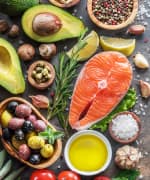Life Extension Magazine®
Many people want to lose weight to look and feel better.1,2
Shedding extra pounds also supports healthier aging.
Excess body weight is associated with an increased risk of heart disease, type II diabetes, and several types of cancer.
Sleep apnea, osteoarthritis, and high blood pressure are directly related to surplus body mass.3,4
Research shows that losing as little as 5% of body weight can provide health benefits.5
The wrong kind of dieting causes biological changes that can make it challenging to lose weight, including an increase in hunger hormones.6
But it doesn’t have to be so difficult.
Researchers have identified a blend of extracts from lemon verbena leaf and hibiscus flower that can reduce hunger signals and promote satiety (a feeling of fullness).7-10
Two clinical trials have shown that these extracts can almost double the amount of weight loss compared to a placebo, when used in conjunction with a healthy diet and exercise.7,8
To improve compliance and support healthy weight loss, a lifestyle app has been developed that further facilitates losing weight with these extracts. Over 85% of the app users taking the supplement reduced their body weight, losing an average of 12.6 pounds in three months.11
Why Weight Loss Is So Hard
Shedding pounds is rarely easy.
Dieting causes changes in metabolism and appetite-related hormones that can make it harder to lose weight and keep it off.6
For example, weight loss leads to a rise in circulating ghrelin, a hunger hormone that increases appetite.12
Weight loss also causes the body to secrete less glucagon-like peptide-1 (GLP-1), a hormone that increases satiety.
Furthermore, a decrease in body weight reduces resting energy expenditure, or what we commonly refer to as metabolic rate.6
Lemon Verbena and Hibiscus
Hibiscus is known for a bright red herbal tea made from its flower.
Lemon verbena is an herb beloved for its lemony aroma and flavor.
Both plants are rich in polyphenols that can help promote weight loss—without the unwanted side effects of drugs.7,13,14
In a preclinical cell study, hibiscus extract was shown to significantly inhibit the creation of new fat cells. It also reduced the accumulation of triglycerides in fat cells.15
When excess triglycerides build up in fat cells, it leads to oxidative stress. That can trigger the inflammation that promotes diseases associated with obesity.16
In the cell study, hibiscus extract led to a 30% reduction in the generation of damaging reactive oxygen species.15
Preclinical research has shown that lemon verbena extract can decrease triglyceride accumulation in fat cells.17
Triglycerides are the most common type of fat in your body. They come from foods like butter, oils, other fats and glucose-boosting foods (starches) and sugary beverages.
Triglycerides not needed for energy production circulate in the blood and are stored in our cells as fat.
Curbing Appetite
A blend of lemon verbena leaf and hibiscus flower extracts was tested in a rigorous, placebo-controlled trial of 47 overweight and obese women.7
All subjects were advised to ingest approximately 2,200-calories a day. They were also encouraged to walk at least half an hour daily during the two-month study.
Roughly half the participants took 500 mg of the plant extracts 20 to 30 minutes before breakfast every day. The other half were given a placebo.
Those taking the lemon verbena-hibiscus combination had a 56.4% decrease in feelings of hunger, on average. They also experienced a significant increase in the satiety-promoting hormone GLP-1, accompanied by an increase in food intake-related satisfaction.
Decreased appetite may have been one factor that led to greater weight loss. In two months, the treatment group lost 7.7 pounds, while the placebo group lost only 4.6 pounds.
If this does not sound like much weight, it represents the real-world challenges people face when attempting to shed excess body weight.
Controlling Calorie Intake
In another trial, scientists gave 33 overweight and obese men and women 500 mg of lemon verbena-hibiscus extract or a placebo daily before breakfast.9
After 60 days, both groups returned to the lab and were fed a standardized breakfast. A few hours later, they were served a buffet-style lunch.
The group taking the extracts ate almost 10% fewer calories at lunch than the placebo group did and reported a significant improvement in satiety.
After taking the lemon verbena-hibiscus extract, the men and women had a 12% increase in GLP-1 after breakfast and a 22% increase after lunch, promoting a feeling of fullness.
What you need to know
Herbal Appetite Control for Weight Loss
- Losing as little as 5% of body weight can reduce the risk of many chronic diseases, including heart disease and type II diabetes.
- Difficulty controlling appetite is a major obstacle for people trying to lose weight.
- Extracts from a blend of lemon verbena leaf and hibiscus flower can increase satiety hormones to help curb appetite.
- Clinical trials of a combination of lemon verbena and hibiscus extracts have shown that it can reduce body weight by 5% within two months and trim the waistline by more than 2.5 inches.
- These extracts work best when combined with a healthy diet and regular exercise. Studies have shown that a digital app can help keep weight loss efforts on track and promote a healthier lifestyle.
Trimmer Waistlines
Shedding pounds promotes metabolic health.18
In a placebo-controlled clinical trial of overweight or obese women, scientists tested whether 500 mg of lemon verbena-hibiscus extract could increase weight loss.8
All the women were instructed to walk at least 30 minutes daily and encouraged to consume 2,200 calories a day.
After two months of taking the plant extracts,8 overweight participants with an average body mass index (BMI) of 27 kg/m2:
- Lost over eight pounds, or 5.4% of their starting weight,
- Decreased their body mass index (BMI) by 1.5 points,
- Trimmed their waistline by 2.7 inches,
- Reduced their percentage of body fat by 1.3%,
- Lowered their systolic blood pressure (top number) by 20.6 mmHg, and
- Decreased their resting heart rate by 8.5 beats per minute.
These changes were all significantly better than the changes in subjects given a placebo.
Most notably, the extract group lost about twice as much weight and almost four times as many inches from their waistline as the placebo group.
Obese participants (average BMI of 34 kg/m2) taking the extracts lost over 10 pounds, or 5.3% of their body weight.
They also lowered their heart rate by eight beats per minute and reduced systolic blood pressure by 18.4 mmHg.
A reduction in heart rate is significant because an elevated resting heart rate is one of the predictors of both cardiovascular and all-cause mortality.
Summary
A combination of lemon verbena and hibiscus extracts has been shown to promote fat burning and shift appetite hormones in ways that make it easier to eat less and lose weight.
Lifestyle Tips for Acheiving Healthy Weight
Life Extension has long recommended the Mediterranean diet for maintaining healthy weight, heart health and longevity. (See Life Extension Magazine® December 2021).
In addition, the American Heart Association recommends moderate, regular exercise.21 This should include, 150-300 minutes a week of heart-pumping exercise, muscle strengthening two days a week, and reduced sitting.
Controlled clinical trials of overweight adults have found that taking 500 mg of combined lemon verbena-hibiscus extracts for two months can produce an average of 5% reduction in body weight.
Modest, sustainable weight loss like this can go a long way toward reducing the risk of common cardiovascular and metabolic diseases.
If you have any questions on the scientific content of this article, please call a Life Extension Wellness Specialist at 1-866-864-3027.
Boost Motivation with a Mobile App
As our phones become increasingly integrated into our lives, many people are relying on mobile apps to improve their health. There are apps with exercise programs, sleep-tracking programs, and now an app that was especially designed to improve weight loss in conjunction with the lemon verbena-hibiscus extract.
Mobile apps can support a more comprehensive approach to weight loss, which could help with managing weight over the long term.19,20
In a 90-day real-world study, 397 volunteers took 500 mg of a lemon verbena-hibiscus extract blend daily, administered in a yogurt drink.11
They also used a custom app designed to help them develop a healthier lifestyle.
The interactive app:11
- Gradually introduced healthy behavior changes,
- Provided reminders to take the extract blend,
- Encouraged water, vegetable, and fruit intake,
- Tracked exercise, food, and water intake,
- Helped track weight changes, and
- Provided motivational messages and incentives.
In those completing the study, the app boosted adherence to the extracts by more than five times compared with typical dietary supplements.11
The participants’ lifestyle improved, too. They doubled their water intake and fruit and vegetable consumption. And they increased their exercise by 33% over baseline.
These changes paid off.
Over 85% of the users reduced their body weight, losing an average of 12.6 pounds in three months.11
(A similar app is available at no charge to lemon verbena-hibiscus extract users.)
References
- Poulimeneas D, Anastasiou CA, Kokkinos A, et al. Motives for weight loss and weight loss maintenance: results from the MedWeight study. J Hum Nutr Diet. 2021 Jun;34(3):504-10.
- Silva DFO, Sena-Evangelista KCM, Lyra CO, et al. Instruments for evaluation of motivations for weight loss in individuals with overweight and obesity: A systematic review and narrative synthesis. PLoS One. 2019;14(7):e0220104.
- Santos AL, Sinha S. Obesity and aging: Molecular mechanisms and therapeutic approaches. Ageing Res Rev. 2021 May;67:101268.
- Spreckley M, Seidell J, Halberstadt J. Perspectives into the experience of successful, substantial long-term weight-loss maintenance: a systematic review. Int J Qual Stud Health Well-being. 2021 Dec;16(1):1862481.
- Blackburn G. Effect of degree of weight loss on health benefits. Obes Res. 1995 Sep;3 Suppl 2:211s-6s.
- Busetto L, Bettini S, Makaronidis J, et al. Mechanisms of weight regain. Eur J Intern Med. 2021 Jan 16.
- Boix-Castejon M, Herranz-Lopez M, Perez Gago A, et al. Hibiscus and lemon verbena polyphenols modulate appetite-related biomarkers in overweight subjects: a randomized controlled trial. Food Funct. 2018 Jun 20;9(6):3173-84.
- Herranz-Lopez M, Olivares-Vicente M, Boix-Castejon M, et al. Differential effects of a combination of Hibiscus sabdariffa and Lippia citriodora polyphenols in overweight/obese subjects: A randomized controlled trial. Sci Rep. 2019 Feb 28;9(1):2999.
- Serna A, Marhuenda J, Arcusa R, et al. Effectiveness of a polyphenolic extract (Lippia citriodora and Hibiscus sabdariffa) on appetite regulation in overweight and obese grade I population: an 8-week randomized, double-blind, cross-over, placebo-controlled trial. Eur J Nutr. 2021 Sep 30.
- Marhuenda J, Perez S, Victoria-Montesinos D, et al. A Randomized, Double-Blind, Placebo Controlled Trial to Determine the Effectiveness a Polyphenolic Extract (Hibiscus sabdariffa and Lippia citriodora) in the Reduction of Body Fat Mass in Healthy Subjects. Foods. 2020 Jan 6;9(1).
- Monteloeder Internal Data. 2021.
- Melby CL, Paris HL, Foright RM, et al. Attenuating the Biologic Drive for Weight Regain Following Weight Loss: Must What Goes Down Always Go Back Up? Nutrients. 2017 May 6;9(5).
- Amos A, Khiatah B. Mechanisms of Action of Nutritionally Rich Hibiscus sabdariffa’s Therapeutic Uses in Major Common Chronic Diseases: A Literature Review. J Am Coll Nutr. 2021 Jan 28:1-8.
- Abderrahim F, Estrella S, Susin C, et al. The antioxidant activity and thermal stability of lemon verbena (Aloysia triphylla) infusion. J Med Food. 2011 May;14(5):517-27.
- Herranz-Lopez M, Fernandez-Arroyo S, Perez-Sanchez A, et al. Synergism of plant-derived polyphenols in adipogenesis: perspectives and implications. Phytomedicine. 2012 Feb 15;19(3-4):253-61.
- Furukawa S, Fujita T, Shimabukuro M, et al. Increased oxidative stress in obesity and its impact on metabolic syndrome. J Clin Invest. 2004 Dec;114(12):1752-61.
- Herranz-Lopez M, Barrajon-Catalan E, Segura-Carretero A, et al. Lemon verbena (Lippia citriodora) polyphenols alleviate obesity-related disturbances in hypertrophic adipocytes through AMPK-dependent mechanisms. Phytomedicine. 2015 Jun 1;22(6):605-14.
- Powell-Wiley TM, Poirier P, Burke LE, et al. Obesity and Cardiovascular Disease: A Scientific Statement From the American Heart Association. Circulation. 2021 May 25;143(21):e984-e1010.
- Zhou M, Zhang N, Zhang Y, et al. Effect of Mobile-Based Lifestyle Intervention on Weight Loss among the Overweight and Obese Elderly Population in China: A Randomized Controlled Trial. Int J Environ Res Public Health. 2021 Aug 21;18(16).
- Eisenhauer CM, Brito F, Kupzyk K, et al. Mobile health assisted self-monitoring is acceptable for supporting weight loss in rural men: a pragmatic randomized controlled feasibility trial. BMC Public Health. 2021 Aug 18;21(1):1568.
- Available at: https://www.heart.org/en/healthy-living/fitness/fitness-basics/aha-recs-for-physical-activity-in-adults. Accessed November 5, 2021.








